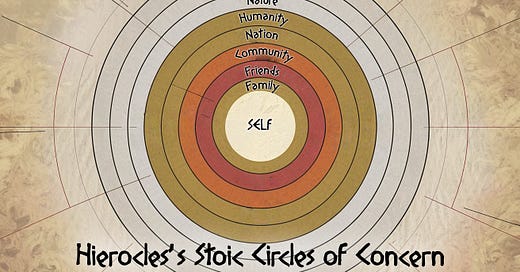Does Stoicism Force Conservatives To Think Like Liberals?
Stoic philosophy vs the conservative brain
Conservatives and liberals don’t empathize the same way.
Given 100 “moral units” to allocate among family, friends, country, and more remote entities like distant humans, animals, and nature, they favor “parochial” concerns — family, friends, and nation1.
Liberals distribute more units to “universalist entities” like humanity, animals, and all of existence.
Why do liberals and conservatives empathize differently?
The consensus is a mix of environmental and genetic variables2. These generate a baseline temperament influencing our “circle of concern” and political ideology.
Because Stoicism asks adherents to adopt a cosmopolitan framework similar to the “universalist” liberal morality, does this restrict Stoicism to liberals? Will conservatives find it an alien mindset?
Stoic Cosmopolitanism
The heat map at the top of this article aligns surprisingly well with the "circles of concern,” discussed by The Stoic philosopher Hierocles, whose work has survived in several papyrus fragments.
After describing the moral circles, he writes:
“it is the province of him who strives to conduct himself properly in each of these connections to collect, in a certain respect, the circles, as it were, to one centre, and always to endeavour earnestly to transfer himself from the comprehending circles to the several particulars which they comprehend.3”
In other words, treat your family as yourself, your friends as your family, your community as your friends, etc, all the way out. Translated into the above study, Hierocles wants us to allocate more moral units to the fringes, which conflicts with the conservative allocation. Conservatives might well find this unappetizing.
You Can’t Explain Away Conservative Stoics
“Let this verse be in your heart and in your mouth: “I am a human being, I regard nothing human as foreign to me.” — Seneca, Letters on Ethics, 95.53
And yet the ancient Stoics don’t fit neatly into our liberal and conservative boxes.
Outside of his cosmopolitanism, Hierocles strikes me as conservative, seeking to serve the gods, promote wedlock, and serve his nation. Cato the Younger has an approach to nonviolence and forgiveness in his personal life that looks dovish, but he fought to the last to preserve the Roman Republic. Monsonius Rufus might have been a protofeminist arguing for educating women, but he also thought men should grow beards and women belonged in the home.
The only constant among Stoics is a belief that virtue is the only good. This framework doesn’t specify what actions and beliefs are virtuous — we reason that out. So it’s unsurprising that virtuous people come to different conclusions about what’s right.
America has committed socialists who own AR-15 rifles and die-hard Republicans who’ve fitted their roofs with solar panels. We can reason ourselves into surprising places if left to our own devices.
The circles of concern can be discarded without invalidating Stoicism. What can never be discarded is justice. If you find a way to be just while advocating for parochial or universalist allocations of those 100 moral points, Stoicism has room for you.
When Parocialists Act Like Cosmopolitans
Psychological research suggests conservatives and liberals find common ground when approaching moral arguments the right way. The best-researched approach is “moral reframing,” or arguing for a policy that members of the “opposing” group wouldn’t normally support by emphasizing moral concerns its members strongly ascribe to4.
A classical example from the 1980s and 1990s is free trade in the United States. Some liberals liked the humanitarian aspects. Many conservatives liked that it could enriched our allies, which in turn enriched the US by giving us richer people to trade with, and that richer allies could afford to invest in defense and cooperate on US security aims. This frame justified trade as part of America’s greatness, and something to be patriotic about. Conservatives loved it even as it benefited the rest of the world.
Ancient Stoics used moral reframing to emphasize that they were part of a greater whole, and that by serving that whole, everything benefited, including parochial concerns.
Or, as the Stoic emperor and philosopher Marcus Aurelius put it, "What is not good for the hive, cannot be good for the bee."
Thanks for reading Socratic State of Mind.
If you liked this article, please like and share it, which helps more readers find my work.
Waytz, A. Et al. Ideological differences in the expanse of the moral circle. Nat Commun 10,
Schwabe I, et al. Genes, Culture and Conservatism-A Psychometric-Genetic Approach. Behav Genet. 2016 Jul;46(4):516-28.
Hierocles. Ethical Fragments. How we ought to conduct ourselves towards our kindred.








Anecdotally I've met many more conservative stoics than I've met liberal stoics. Even weirder, I find the liberals tend to have more antibodies to stoic philosophy specifically around agency and self-control than conservatives. Moreso, and I'm not able to recall the exact saying, but I believe there's a lot of conversation in stoicism about not losing yourself to everything but focusing on what matters which maps to the conservative mentality more closely.
Nice article. References are solid. Thanks for sharing!